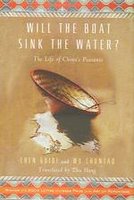Background on rural China
A scholar and journalist who has worked in China for more than 20 years has reviewed an important book about Chinese peasants and government policy toward the farmers. on the Danwei web site.I haven't read it, but it sounds like a good primer on rural China for teachers and a good source for student research. Maybe the school library should have a copy. It's available at Amazon.com for $16.50.
Will the Boat Sink the Water? a review by Göran Leijonhufvud

"It caused a stir when it appeared in 2003 and it is still dynamite. The profoundly revealing Life of Chinese Peasants (Zhongguo nongmin diaocha) had party bureaucrats at all levels running for cover...
"The book is now out in English under the title Will the Boat Sink the Water? The Life of China's Peasants (PublicAffairs, London 2006)... Although some conditions have improved for the farmers, notably the lessening of their tax burden, the basic problems are still there. Impoverished peasants are treated like dirt by township and county cadres, and often even by their own village cadres.
"Yet, in the bigger scheme of things, it is the peasants that support industrialization, urban construction and the much talked about rising middle class. The peasants are supporting urban and industrial expansion not only by the added value created by their agricultural work, but also by being the actual workers in all construction projects. At the same time they are systematically discriminated against by the household registration system, and largely kept from enjoying the fruits of China's stunning growth. The authors use the expression One country, two 'nations' to describe the institutionalized disparity between the urban and rural population.
"[The authors] Chen Guidi and Wu Chuntao are both from the countryside. They investigated conditions in 50 villages in Anhui province, one of China's poorest...
"Since the book was first published, the Chinese government has cancelled the agricultural tax. This is a remarkable departure from a 2,500 years old practice... Furthermore, township and village cadres are forbidden to charge other fees. This time, the policy seems to be more strictly implemented than earlier such central directives...
"[C]onflicts with peasants these days instead typically revolve around illegal land seizures and blatantly insufficent compensation when land is occupied for anything from necessary road projects to luxury villa developments or golf courses. Another reason for forceful farmer protests has been toxic emissions threatening not only their crops but also their very lives...
"The English title Will the Boat Sink the Water? is a play on a few words of warning from the Taizong Emperor of the Tang Dynasty more than one thousand years ago: 'Water holds up the boat; water can also sink the boat.' Water refers to the peasants holding up emperors and officials in the boat. The Tang Dynasty emperor never imagined that the boat could actually sink the water.
"Publisher's Weekly says, in part, 'What's most surprising about this exposé of the Chinese government's brutal treatment of the peasantry is not that it was banned in China, but that it got past the censors in the first place. The authors—a husband and wife team who have received major awards—recount how, in the poor province of Anhui, greedy local officials impose illegal taxes on the already impoverished peasantry and cover their tracks through double-bookkeeping...'"



0 Comments:
Post a Comment
<< Home